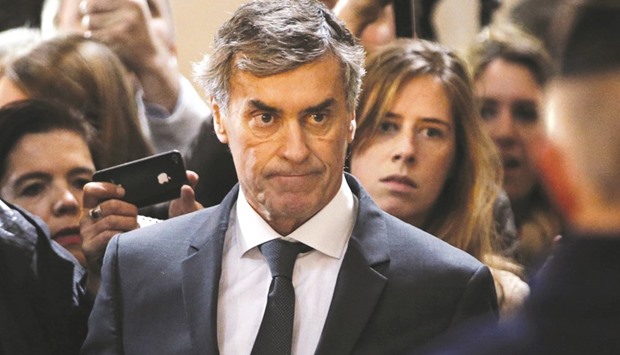France’s former budget minister Jerome Cahuzac, who stashed millions abroad while cracking down on tax cheats at home, went on trial yesterday for tax fraud.
The 63-year-old former rising star in the French Socialist Party, now dubbed the finance ministry’s “Pinocchio”, fended off reporters as he arrived at the Paris criminal court.
His ex-wife and co-defendant Patricia Menard, with whom he ran a lucrative hair transplant clinic, arrived separately.
Nearby, dozens demonstrated against the impunity of the banking system, with one cigar-chomping protester in top hat and tails impersonating a banker.
Cahuzac and Menard face up to seven years in jail and €2mn ($2.2mn) in fines if found guilty of tax fraud and money laundering.
The defence opened by challenging the constitutionality of the case, arguing that Cahuzac has already settled his debts and should not be tried twice over the same matter.
“Even if the press calls someone a ‘pariah’ we can still follow the law, and (the double jeopardy recourse) is a question of law,” said Cahuzac’s lawyer Jean Veil.
Both Cahuzac and Menard have paid back taxes and penalties, their lawyers argued.
The court was told she had returned more than €2mn although no figure was given for the ex-minister.
If the question is referred to the constitutional court, the trial could be delayed by several months. If not, it is scheduled to end on February 18.
The scandal was the first of a series that have tarnished the presidency of Francois Hollande, who had promised a squeaky clean government after succeeding Nicolas Sarkozy, the subject of several graft investigations, in 2012.
To begin with, Cahuzac vehemently denied the allegations, notably before parliament and to Hollande, after the Mediapart news website broke the story in December 2012.
Cahuzac, whose remit included fighting tax fraud, lodged a defamation suit against Mediapart.
But the trained surgeon resigned his post after a formal investigation was launched in March 2013.
Two weeks later, he confessed to having held an account with Swiss banking giant UBS and said he was “consumed by remorse”.
The scandal prompted Hollande to order his ministers to disclose their personal wealth, a first in France, where personal finances are rarely discussed and the wealth of public officials had long been considered a private matter.
But many, including Cahuzac himself, say he has served as a scapegoat as tax havens continue to conceal riches, not just for individuals but also for corporations, notably banks.
The protesters outside the court yesterday, who partially blocked a bridge over the Seine with chairs stolen from banks, said that Cahuzac’s case did little to change the status quo.
“They say the Cahuzac affair was an electroshock, but only small steps have been taken,” said activist Thomas Coutrot, claiming: “French banks are massively present in tax havens.”
Also in the dock are the divorced couple’s erstwhile advisers, Swiss banker Francois Reyl and Dubai-based lawyer Philippe Houman.
The Reyl bank of Geneva, which in 2009 allegedly helped Cahuzac transfer funds to Singapore to avoid detection, is also being tried.
The story of the fraud, carried out between 1992 and 2013, reads like a cross between an airport novel and an international financial crime manual.
In one episode, Cahuzac, using the codename “Birdie”, allegedly received two cash payments of €10,000 each in the streets of Paris.
A “friend” opened an account with UBS in 1992, then Cahuzac himself opened one in his own name in 1993.
In 1998, all the funds were allegedly transferred to Reyl, totalling some €600,000 by 2009.
That was when Switzerland’s tradition of banking secrecy began to fall apart.
Cahuzac then allegedly channelled the funds to Singapore, taking a labyrinthine route through a shell company registered in the Seychelles set up by Houman, the lawyer.

Cahuzac: confessed to having held an account with Swiss banking giant UBS.
